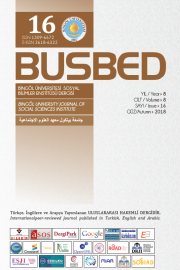FAST-FOOD İMPARATORLUĞUNUN ZİHNİYETİNİ RİTZER’İN “MCDONALDLAŞMA” KAVRAMI ÜZERİNDEN OKUMAK
INTERPRETING THE MENTALITY OF FAST-FOOD EMPIRE WITH RESPECT TO RITZER’S CONCEPT OF THE “MCDONALDIZATION”
Author(s): Jale KarhanSubject(s): Business Economy / Management, Evaluation research, Sociology of Culture, Globalization, Socio-Economic Research
Published by: Bingöl Üniversitesi Sosyal Bilimler Enstitüsü
Keywords: McDonaldization; Fast Food Culture; Meal; Personal; Political;
Summary/Abstract: The things that we eat and drink are the signs of our identity and they change and transform us. Food is not only a physiological need for survival but also a universal, local, communicative, cultural, religious, class, ethnic, symbolic, ideological, economic, moral, geographical, historical, political and social phenomenon. So food is not a personal matter. Consequently, the fast food form we prefer changes, affects and transforms nature, water, agriculture, land, animals, farmers, workers, children, health, family, society and the culture. The goal of writing this article is to question fast-food culture in terms of conscience, morality, social and politics and to reveal what is behind this culture. Sociologically, this topic is covered through “critical social science” approach with respect to Ritzer’s “McDonaldization” thesis. At the end of the work, it is concluded that the McDonaldized systems have their own advantages, attractiveness and charm, but they are certainly harmful for the employees, children, migrants, farmers, nature, animals and agriculture, therefore it is suggested that all the people in the world should fight in a common way against McDonaldization.
Journal: Bingöl Üniversitesi Sosyal Bilimler Enstitüsü Dergisi (BUSBED)
- Issue Year: 8/2018
- Issue No: 16
- Page Range: 405-432
- Page Count: 28
- Language: Turkish

